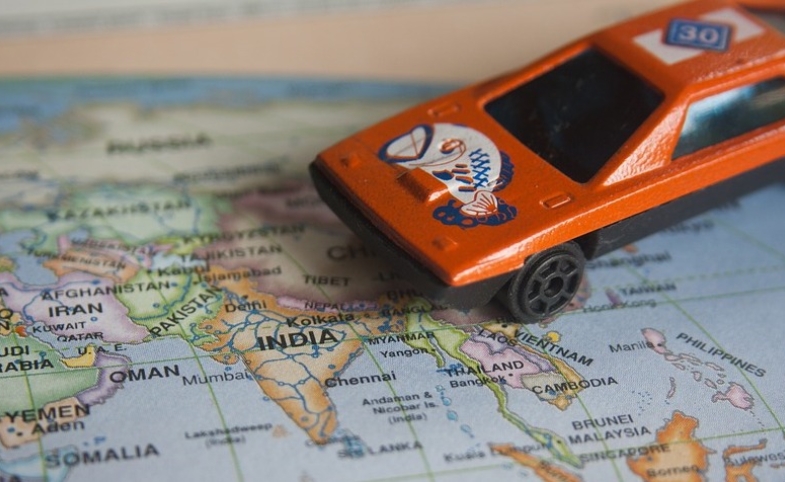The CPD Blog is intended to stimulate dialog among scholars and practitioners from around the world in the public diplomacy sphere. The opinions represented here are the authors' own and do not necessarily reflect CPD's views. For blogger guidelines, click here.

Road Trip!
Unless you’ve been avoiding all news lately, you know that these are rocky days — to put it mildly — for the Trump Administration. Not only are the Democrats up in arms against him, but so are most media, the U.S. intelligence agencies — indeed, most of the civil servants who handle America’s domestic and foreign affairs. Late night talk shows are feasting on Trump’s erratic and threatening behavior. Most polls now say that a majority of Americans want an independent prosecutor to investigate his campaign’s ties to Russia. Republican Senator John McCain, once dissed by the President for having been a POW in Vietnam, told veteran journalist Bob Schieffer this week that the Trump scandals have reached a “Watergate size and scale.”
What better time for a road trip?
In June 1974, just weeks before he resigned as President, Nixon went abroad to escape from the Watergate crisis, traveling to the Middle East for photo-ops with regional leaders. Anwar Sadat arranged for crowds to line the streets for his motorcade in Cairo and Alexandria; Yitzak Rabin greeted Nixon in Tel Aviv and Jerusalem; the father of the current Syrian dictator hosted Nixon in Damascus; the father of the current King of Jordan hosted Nixon in Amman. In the Gulf, his host was the head of the house of Saud. They all knew Nixon was politically crippled but it didn’t matter. Except for Rabin, his hosts didn’t have to worry about their own public opinion and Nixon’s political crisis really had nothing to do with foreign policy.
President Trump’s first overseas trip, by contrast, had not been planned as a diversion from a political crisis at home but now functions as one.
His battered staff would like nothing better than to use the events and purposefulness of a foreign trip to change the narrative but they will find it difficult.
In today’s interconnected world, a change of scenery does not bring a U.S. President respite. Foreign media are just as concerned about Trump’s behavior — particularly because Trump’s relations with Russia and his comments on foreign affairs have been so controversial. The Atlantic has compiled a sampling of what their fears are.
Countries large and small are calculating that America’s influence or attention — perhaps both — are on the wane.
Trump’s first stop is Riyadh and a call on King Salman, half-brother of Nixon’s host in 1974, King Faisal. Next Israel, whose intelligence service gave Trump the information on ISIS that he disclosed to Russia last week without informing Israel. Awkward. Then on to Rome for a call on Pope Francis at the Vatican. Then, a NATO summit in Brussels that will be unlike any the alliance has ever undertaken, according to Foreign Policy. No long discussions, sound-bite sentences only. Very strict instructions. Finally, a G-7 meeting in Sicily.
This is the stuff of grand backdrops but fleeting substance.
America’s closest allies must wonder what intelligence can be shared with the U.S. President; Japan and South Korea must wonder if he understands his Pacific fleet deployments; Australia must doubt his commitments; Mexicans are still stewing over Trump’s insults to them; Canada, traditionally the first foreign stop by a new U.S. President, has been slapped with a new surcharge on timber exports to the U.S. Have I left anyone out?
Indeed, countries large and small are calculating that America’s influence or attention — perhaps both — are on the wane. U.S. military will be funded, but U.S. diplomacy will not. Foreign aid and development policy will be ignored. America’s adherence to the Paris agreement on climate is in doubt.
America’s only bilateral relationship that can be said to have improved in the last 100 days is the relationship with China, President Trump got rid of TPP, a trade deal that was intended to be a counterweight to China, and instead signed a bilateral deal with China that reduced trade barriers in agricultural products and banking.
I am now traveling in Southeast Europe, where U.S. policy in the 1990’s and 2000’s helped end conflict and bring integration of the region into European institutions. Such activism is a memory now. In Croatia, where I happen to be at the moment, the national government has been shaken by the near-bankruptcy of the country’s largest company, whose largest investor is Sberbank, a bank owned by the Russian state. In Brussels, Montenegro will be welcomed as NATO’s newest member but Russia continues to threaten countries along its perimeter, particularly Ukraine, where Russia’s involvement in the Donbass conflict and Russia’s occupation of Crimea continue. Such are the pieces that determine a country’s influence in foreign affairs. We do not yet know whether in such matters, replicated in dozens of ways around the world, America will choose to have a voice and, if so, whether it will be heard — and, if finally heard, and if it is the voice of Trump, what it will say. That uncertainty itself is destabilizing and makes for a rocky road trip.
Visit CPD's Online Library
Explore CPD's vast online database featuring the latest books, articles, speeches and information on international organizations dedicated to public diplomacy.
POPULAR ARTICLES
-
January 29
-
January 20
-
January 28
-
February 6
-
January 8
Join the Conversation
Interested in contributing to the CPD Blog? We welcome your posts. Read our guidelines and find out how you can submit blogs and photo essays >.









